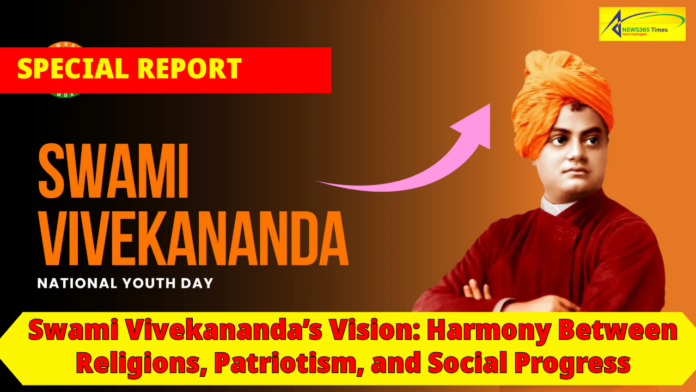Swami Vivekananda’s Vision: Harmony Between Religions, Patriotism, and Social Progress Reflecting on His Teachings on National Youth Day

As India celebrates National Youth Day on January 12, commemorating the birth anniversary of Swami Vivekananda, it is an opportune moment to revisit his teachings on Hinduism, Islam, patriotism, and social challenges like cow protection. His vision for India was rooted in inclusivity, spiritual awakening, and unity, making him a timeless icon for the youth of the nation.
Hinduism: A Religion of Spiritual Freedom and Tolerance
Swami Vivekananda upheld Hinduism as a profound spiritual tradition that embraced diversity. He viewed it as a faith that nurtured tolerance and universal acceptance, offering a path to self-realization. In his famous Chicago speech at the World Parliament of Religions in 1893, he said: “I am proud to belong to a religion which has taught the world both tolerance and universal acceptance.”
For Vivekananda, Hinduism’s greatness lay in its ability to evolve and accommodate new ideas, making it a unifying force in a pluralistic society.
Islam: A Lesson in Brotherhood and Unity
While firmly rooted in his Hindu identity, Vivekananda admired Islam for its egalitarian spirit and sense of brotherhood. He believed that the strengths of Hinduism and Islam could complement each other to build a harmonious India. He famously envisioned: “For our motherland, a union of Hinduism and Islam is the only hope.”
Vivekananda’s call for interfaith understanding highlights the importance of mutual respect and cooperation to overcome religious divides.
Cow Protection: A Matter of Sensitivity and Harmony
The issue of cow protection has historically been a flashpoint of communal tensions in India. Vivekananda respected the Hindu reverence for the cow, seeing it as a symbol of nurturing and life. However, he was critical of making cow protection a political or divisive issue, urging people to focus on the deeper values of their faith.
He stated: “Do you think that by killing a few cows, the religion of the Hindus will be destroyed? It is not so.”
Vivekananda emphasized that true religion is about spiritual growth and uplifting society, not rigid adherence to rituals or symbols that fuel conflict.
Patriotism: Service and Sacrifice for the Nation
For Swami Vivekananda, patriotism was inseparable from selfless service to society. He believed in empowering the youth to build a strong, united, and progressive India. His idea of nationalism transcended religious or regional identities, focusing instead on education, equality, and the eradication of poverty.
He urged the youth to dedicate themselves to the nation, saying: “Arise, awake, and stop not till the goal is reached.”
Vivekananda’s vision of patriotism was rooted in action and unity, urging Indians to overcome divisions and work collectively for national progress.
Relevance on National Youth Day
As we honor Swami Vivekananda on National Youth Day, his teachings remain deeply relevant. They inspire the youth to:
- Embrace harmony between religions and foster mutual respect.
- Prioritize education, self-improvement, and service to society.
- Focus on unifying the nation by addressing pressing social and economic issues.
Swami Vivekananda’s profound insights on Hinduism, Islam, cow protection, and patriotism offer a roadmap for building a just and harmonious society. As India’s youth celebrate his legacy, they are reminded of their responsibility to rise above divisions, embrace inclusivity, and work towards the nation’s progress with courage and conviction.
His words continue to resonate: “Youth is the best time. The way in which you utilize this period will decide the nature of coming years that lie ahead of you.” Let us honor his legacy by embodying his ideals in our actions and aspirations.




